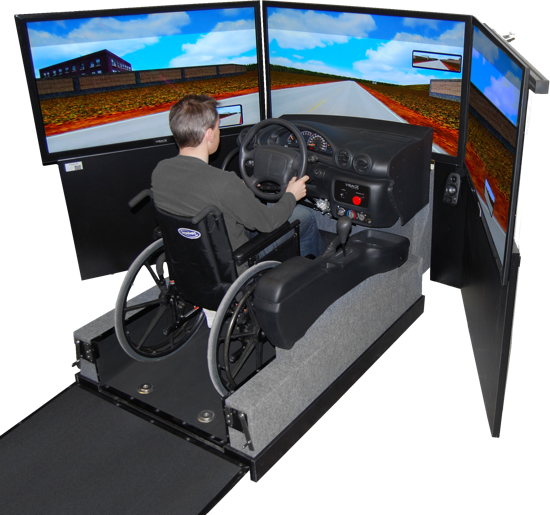CAR SIMULATOR FOR REHABILITATION – VS500M-R

REHAB SIMULATOR SYSTEM SPECIFICATION
REHAB SIMULATOR EVALUATIONS
REHAB SIMULATOR DRIVER EDUCATION & REHABILITATION
REHAB SIMULATOR RESEARCH
REHAB SIMULATOR BEYOND TECHNOLOGY – A PERSONAL NOTE
REHAB SIMULATOR RESEARCH STUDIES
Virage Simulation VS500M-R driver assessment and rehabilitation car driving simulator system.

REHAB SIMULATOR EVALUATIONS

Evaluations need to measure a driver’s ability to control a vehicle and to anticipate and manage risk in complex and variable environments. The Multidimensional Driver Assessment™ records driver performance, e.g. lateral position , speed, reaction time, headway, in relation to programmed traffic events during a continuous drive. Measures are combined and processed in real time to calculate scores for each driving dimension of interest, e.g. legality, safety and courtesy. Individual and group scores are kept to monitor progress and to guide the selection of remedial practice scenarios and further tests.
REHAB SIMULATOR DRIVER EDUCATION & REHABILITATION

Vision is the basis of driving and attention is the basis of learning. The Virage Simulation curriculum is based on training and improving drivers’ visual attention. Foundation skills, e.g. lane keeping and turning, as well as higher order skills like Hazard Perception and Collision Avoidance require disciplined visual attention. Our library of scenarios recreate the complexity of real-world driving (i.e. diverse road, traffic and weather conditions) and use Best Practices in training pedagogy to set standards for driver behavior and performance. Learners work with or without a trainer and they receive a variety of cues and feedback designed to enhance learning efficiency and increase retention.
REHAB SIMULATOR RESEARCH

Glenrose Hospital’s VS500M-R simulator is used for continuing research aimed at a wide range of rehabilitation needs. Currently, on-road test scores have limited reliability (inter-rater and test-retest) and neuropsychological tests lack face-validity and are insensitive to the effects of driving experience and domain-specific compensatory skills. Controlled studies comparing simulator evaluations with clinical test results and on-road scores hold promise for more valid predictions of on-road driving performance. Our scientific package and standardized training and evaluation scenarios facilitate this research.
REHAB SIMULATOR BEYOND TECHNOLOGY – A PERSONAL NOTE
 On August 17, 2006, Richard Kerr [left] was the victim of a high-speed hit and run. His coma was classified as 3 on the Glasgow Scale. Richard survived with traumatic brain injury and regained his driver’s permit after retraining on the Virage Driving Simulator. In his own words, the “cognitive exercise and benefits to self-esteem and confidence alone had enormous positive effect in my recovery”.
On August 17, 2006, Richard Kerr [left] was the victim of a high-speed hit and run. His coma was classified as 3 on the Glasgow Scale. Richard survived with traumatic brain injury and regained his driver’s permit after retraining on the Virage Driving Simulator. In his own words, the “cognitive exercise and benefits to self-esteem and confidence alone had enormous positive effect in my recovery”.
Read more at: https://biac-aclc.ca/en/2010/09/09/richard-kerr-from-montreal-quebec-profile-of-courage-hope-and-inspiration/
REHAB SIMULATOR RESEARCH STUDIES

Research studies “strongly support the use of virtual reality driving simulators as a sensitive and effective tool for driving assessment… [and] offer compelling evidence highlighting their potential effectiveness for providing retraining to those who have suffered a neurological and/or physical compromise.“
Ref: : Singh, H., Barbour, B. M. et al (2011). Driving Rehabilitation as Delivered by Driving Simulation in Handbook of Driving Simulation for Engineering, Medicine and Psychology.
Demonstration of the VS500M-R driving simulator with wheel chair
Here is an example of how our Clinical Driving Simulator is being used today (NBC Washington News)

